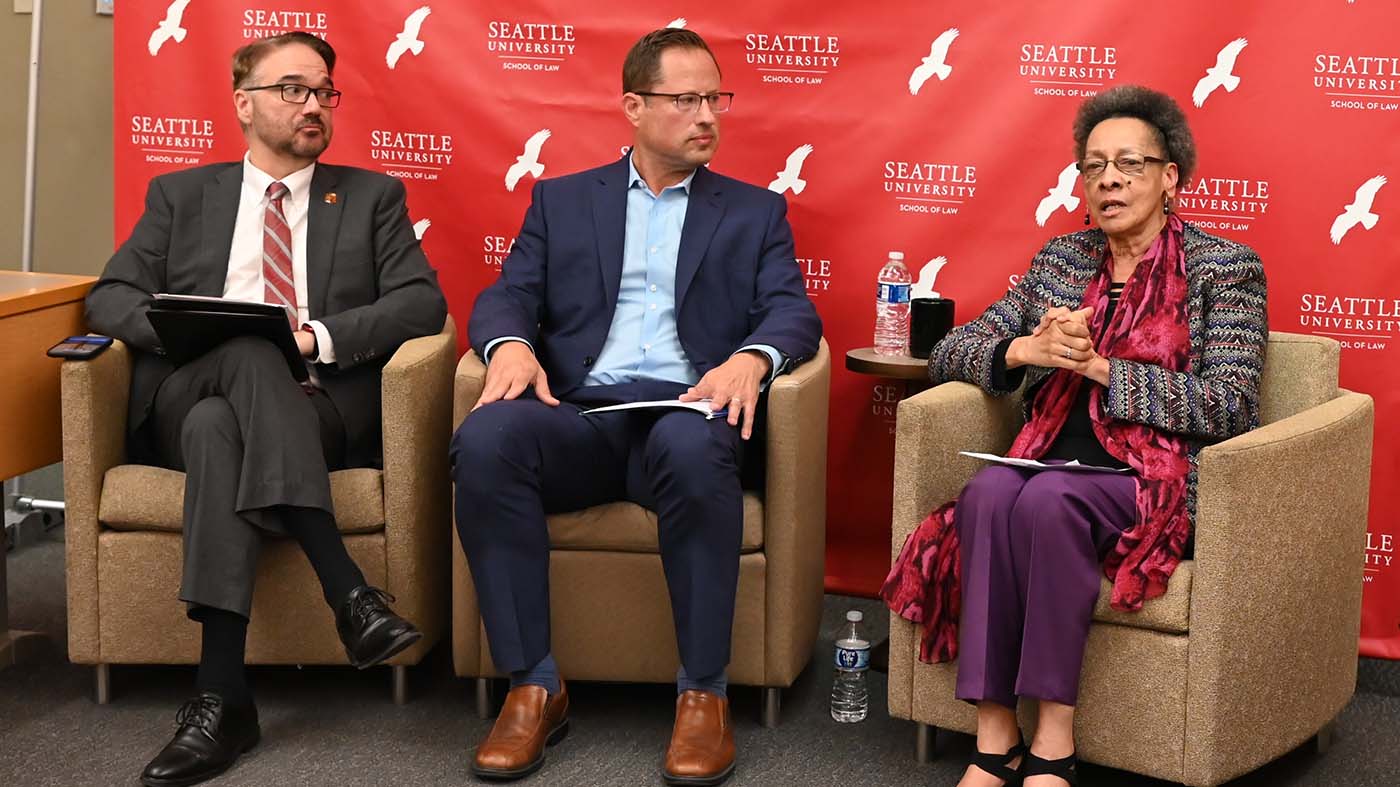Seattle University School of Law kicked off the 2024-25 Dean’s Luminaries in Law Lecture and Conversation Series with international human rights activist Margarette May Macaulay, a world-renowned advocate and jurist.
Macaulay has served as president, vice president, and a commissioner of the Inter-American Commission (IAC) on Human Rights, the equivalent of the United Nations for North and South America. She also spent five years as a judge for the Inter-American Court of Human Rights.
At the event, Dean Anthony E. Varona and Professor Thomas Antkowiak, director of the law school’s International Human Rights Clinic, spoke with Macaulay about her work. Antkowiak’s students have successfully submitted complaints to the IAC on behalf of clients whose rights have been violated. Notably, they recently obtained a decision from the commission and the court in favor of Jason Puracal, a Tacoma man who was wrongfully imprisoned in inhumane conditions in Nicaragua.
Macaulay told her remarkable life’s story, beginning with her childhood in Freetown, Sierra Leone, where she grew up with a mother who wore trousers when it was not socially acceptable for women, and a father who told her, “Just because you’re a woman, you must never think that you have to wait for someone to do something for you.”
Later, as the only Black student at a UK boarding school, Macaulay said she “did not permit any sort of looking-down on me.”
“I grew up not being afraid of authority,” she said. “If there was something wrong in an institution where I happened to be, I went to the top, I dealt with it. I don’t think I was afraid of anything.”
Macaulay took this fearlessness with her when she and her husband emigrated to Jamaica. By giving public speeches, speaking out at political press conferences, and working with politicians in her capacity as an attorney, she advocated for the repeal of dozens of archaic laws hindering women’s rights. For example, Macaulay explained, as recently as the 1970s, a woman and her children could be left homeless if her husband divorced her and married someone else.
As a result of her advocacy, “an act was passed that when a husband walked away from his family or died, the wife could apply to the court for money to be taken out of the estate to maintain her and the children,” Macaulay said.
Macaulay continued her fight for the rights of women, migrants, Afro-descendants, laborers, and other groups while serving on the court and the commission. She was a judge at the time of the Gonzalez, Monreal, and Monarrez v. Mexico ruling, which decreed that the state must provide reparations for acts of violence against women.
She has also been a powerful voice against the practice of child marriage. More than a third of girls in the South American nation of Suriname are married before age 18, and about one in 10 before age 15. Macaulay has met women who were forced into marriage as young as 8.
“You met with the actual people who are affected by inhumane acts, abuses of all kinds, violations of all kinds. It gives you a want and a passion to keep on fighting,” Macaulay said. “Your heart is broken so often, but then you might succeed with one person, and that gives you the impetus to go on.”
Macaulay urged the audience to take on the cause of child marriage in particular, calling it “evil to take girls at young ages and put them with usually much older men to abuse them every day.”
She also spoke to issues and laws in the U.S. that she believes need reform, including reproductive rights.
“You older white males have to stay out of our business. You cannot carry children,” she said. “Women do. It’s their bodies.”
Ultimately, Macaulay called on the next generation of lawyers to do what her parents instilled in her from a young age — help everyone who does not have the same advantages.
“You cannot let feeling overwhelmed defeat what you have to do. No one is going to invite you to speak. You have to seize the opportunity,” she said. “You know what changes you want to see, so seize it and change it.”

